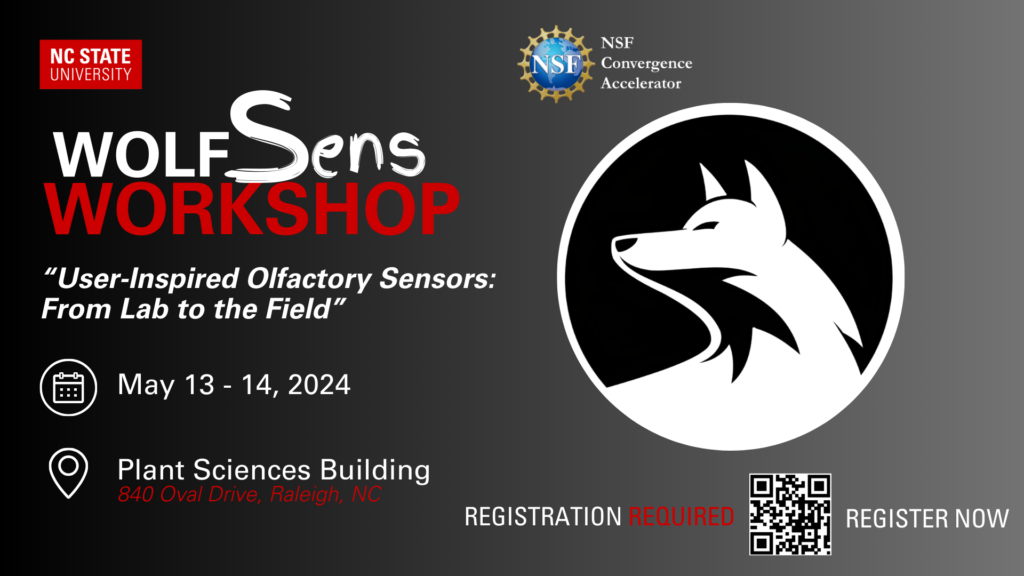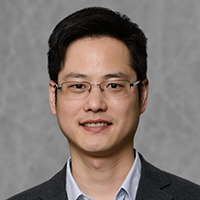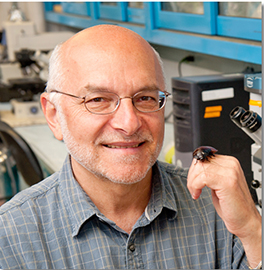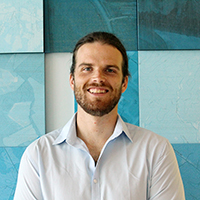Workshop
User-Inspired Olfactory Sensors: From Lab to the Field
May 13-14, 2024
NC State University, 840 Oval Drive, Plant Sciences Building

Moderator: Zach Hetzler, Chemical and Biomolecular Engineering, NC State
Breakfast & Registration (Lobby)
8:00 – 9:00 am
Welcome and Introduction to the Convergence Accelerator project
Qingshan Wei, Associate Professor, Chemical and Biomolecular Engineering, NC State
9:00 – 9:30 am
SESSION I: Cutting-Edge Sensor Technology
Moderator: Edgar Lobaton, Electrical and Computer Engineering, NC State
9:30 – 10:45 am
Low Power CMOS-Compatible Electronic Nose Arrays
Veena Misra, Director, ASSIST Center; MC Dean Distinguished University Professor, Electrical and Computer Engineering, NC State
9:30 – 9:45 am
Soft Wearable Sensing Systems for Human and Plant Health Monitoring
Yong Zhu, Andrew A. Adams Distinguished Professor, Mechanical and Aerospace Engineering, NC State
9:45 – 10:00 am
Bioelectrical and Multimodal Sensing Platforms in Agrarian Environments
Alper Bozkurt, Co-director, ASSIST Center; Distinguished Professor, Electrical and Computer Engineering, NC State
10:00 – 10:15 am
Max Weaver Dye Library: A Treasure Trove
Nelson Vinueza Benitez, Associate Professor, Textile Engineering, Chemistry, and Science, NC State
10:15 – 10:30 am
Can Insect Antennae Inspire Sensor Design?
Coby Schal, Blanton J. Whitmire Distinguished Professor, Entomology and Plant Pathology, NC State
10:30 – 10:45 am
Coffee Break (Lobby)
10:45 – 11:00 am
SESSION II: AI and Machine Learning Application in VOC Sensor
Moderator: Nelson Vinueza Benitez, Textile Engineering, Chemistry, and Science, NC State
11:00 – 12:00 pm
AI Advances in Molecular Structure Modeling
Edgar Lobaton, Professor, Electrical and Computer Engineering, NC State
11:00 – 11:15 am
PROTACs: The Revolution of Rationally Designed Protein Degraders for Crop Protection
Denis Fourches, VP Chemistry Platform , Oerth Bio
11:15 – 11:30 am
Mapping Scent
Alex Wiltschko, Founder and CEO, Osmo
11:30 – 11:45 am
Group Photo (Stairs)
11:45 – 12:00 pm
Lunch (Lobby)
12:00 – 1:30 pm
SESSION III: Panel – Sensor for Plant Health and Digital Agriculture
Moderator: Alper Bozkurt, Electrical and Computer Engineering, NC State
1:30 – 2:10 pm
Panelist 1: Adhikari Diganta, Global Head On-Farm IoT and Agronomic Data Platforms, Syngenta Group
Panelist 2: Ricardo Hernandez, Director, Controlled Environmental Agriculture Coalition (CEAC); Associate Professor, Horticultural Science NC State
SESSION IV: Panel – Sensor for Precision Human and Environmental Health
Moderator: Meredith Spence Beaulieu, Global One Health Academy, NC State
2:10 – 2:50 pm
Panelist 1: Seung-Hyun Cho, Principal Exposure Scientist, RTI International
Panelist 2: Jessilyn Dunn, Assistant Professor, Biomedical Engineering, Duke University
Panelist 3: Sangeeta Joshi, Pulmonologist, Duke Asthma, Allergy, and Airway Center
Coffee Break (Lobby)
2:50 – 3:10 pm
SESSION V: Team Building and Interactive Activities
Moderator: Zach Hetzler, Chemical and Biomolecular Engineering, NC State
3:10 – 4:00 pm
Poster Session, Sensor Demo & Happy Hour (Lobby)
4:00 – 6:00 pm
Adjourn
6:00 pm
TUESDAY, MAY 14 – First floor Seminar room
Breakfast & Registration (Lobby)
8:30 – 9:00 am
Lab Tours and Demonstrations
9:00 – 11:30 am
Guidelines (Seminar room)
Nelson Vinueza Benitez, Textile Engineering, Chemistry, and Science, NC State
9:00 – 9:10 am
Plant Science Building (PSB) tour
Hosted by: Sarah Dinger, Education and Extension, Plant Science Initiative (PSI)
9:10 – 9:50 am
Walk to the Wilson College of Textile
9:50 – 10:00 am
Weaver Dye Library Tour
Hosted by: Zoe Millbern, Textile Engineering, Chemistry, and Science, NC State
10:00 – 10:40 am
Walk to Monteith Engineering Research Center Building (MRC)
10:40 – 10:50 am
ASSIST Tour
Hosted by: Ravi Kiran Chilukuri, Innovation Ecosystem Director, ASSIST Center
10:50 – 11:20 am
Walk to the Plant Science Building (PSB)
11:20 – 11:30 am
Lunch (Lobby)
11:30 – 12:30 pm
Adjourn
12:30 pm
Speakers Bio

Qingshan Wei is an associate professor in the Department of Chemical and Biomolecular Engineering and a University Faculty Scholar at NC State. He is a member of the Emerging Plant Disease and Global Food Security Cluster and co-leads the Infectious Diseases focus area of the Global One Health Academy. He received his Ph.D. degree in Chemistry from Purdue University in 2012, and completed postdoctoral training in the Departments of Electrical Engineering and Bioengineering at UCLA between 2012-2016. His research interests focus on developing novel diagnostic assays and sensors for point-of-care detection of human and plant diseases. He is the recipient of the Goodnight Early Career Innovator Award (2023), the NSF CAREER Award (2020), and Nano Research Young Innovator Award in NanoBiotech (2018).

Alper Bozkurt is currently a Distinguished Professor in the Department of Electrical and Computer Engineering at North Carolina State University. He received a doctorate degree from Cornell University and a master’s degree in biomedical engineering from Drexel University. Dr. Bozkurt is the founder and the director of Integrated Bionic MicroSystems Laboratory at NC State where he explores novel interfaces with sensory and motor neurons, cockroaches, sphinx moths, plants, birds, canines, lemurs, and humans. His recent research achievements on internet-of-bionics-things were covered by several media agencies including BBC, CNN, National Geographic, Discovery Channel, Science Channel, Newsweek, and Reuters. In parallel to his studies, he also worked as an official consultant for the Disney movie “G-Force” produced by Jerry Bruckheimer and participated in the Smart America Challenge organized by the White House Presidential Innovation Fellows. Bozkurt is a recipient of the Calhoun Fellowship from Drexel University, Donald Kerr Award at Cornell University, Chancellor’s Innovation Award (three times), William F. Lane Outstanding Teacher Award and Outstanding Global Engagement Awards at North Carolina State University, the Faculty Early Career Development (CAREER) Award from National Science Foundation and IEEE Sensors Council Young Professional Award. He was included in the Popular Science Magazine Brilliant 10 list in 2015. He received best paper awards from The US Government Microcircuit Applications & Critical Technology Conference and IEEE Body Sensor Network Conference. Dr. Bozkurt currently serves as the Co-Director of The National Science Foundation Nanosystems Engineering Research Center for Advanced Self-Powered Systems of Integrated Sensors and Technologies (ASSIST) and Co-Director of NC State’s Institute of Connected Sensor Systems.

Coby Schal is Blanton Whitmire Distinguished Professor at NCSU. He has a B.S. from SUNY-Albany, and a Ph.D. from the University of Kansas. Coby’s research is mainly on indoor pests such as cockroaches and bed bugs. He investigates their effects on human health, strategies to control these pests, and the discovery of chemical signals that they use to guide their mate-finding and host-finding. He has published more than 360 papers and mentored 43 graduate students and 42 post-doctoral researchers. Coby is Fellow of American Association for the Advancement of Sciences. He was awarded NCSU’s highest faculty award – the Alexander Quarles Holladay Medal for Excellence.

Dr. Edgar J. Lobaton is a faculty in the Department of Electrical and Computer Engineering at North Carolina State University (NCSU). He leads the Active Robotics Sensing (ARoS) Laboratory which addresses problems that integrate sensing, estimation and actuation. Prior to joining NCSU, Dr. Lobaton earned his B.S. in Mathematics and Electrical engineering from Seattle University in 2004. He completed his Ph.D. in Electrical Engineering and Computer Sciences from the University of California, Berkeley in 2009. Dr. Lobaton’s research interested lie in machine learning, computer vision and robotics with applications to wearable technologies and autonomous systems.

As the Senior Director of Data Science & Modeling at Oerth Bio, Dr. Fourches leads a team of scientists tasked with designing and optimizing novel protein degraders and small molecule binders with desired bioactivities. With over 15 years of research experience in cheminformatics, computational chemistry, and data science, Dr. Fourches holds a PhD in Chemistry and completed a postdoc in Cheminformatics from the University of North Carolina at Chapel Hill. Dr. Fourches possesses core scientific competencies including molecular modeling, cheminformatics, bioinformatics, machine learning, QSAR, structure-based molecular design, 3D docking, molecular dynamics simulations, pharmacophore analysis, ligand-based and structure-based virtual screening, DEL data processing & analysis, and PROTAC modeling/design. Dr. Fourches is internationally recognized for expertise in cheminformatics, boasting over 80 peer-reviewed publications, along with multiple awards and honors. Dr. Fourches is passionate about applying their skills and knowledge to create innovative solutions for challenging problems in drug discovery and development. With management styles characterized by “Lead by Example” and “One Team, One Fight,” Dr. Fourches thrives in environments where core values emphasize scientific excellence, scrappiness (resourceful and results-oriented), fundamental trust, and team synergies.

Alex Wiltschko is Founder and CEO of Osmo, on a mission to give computers a sense of smell. He is a repeat entrepreneur and has spent much of his career exploring new frontiers and building businesses at the intersection of AI and biology. Previously, he was a research leader at Google DeepMind, and has founded and exited two AI companies (Syllable, sold to Neumora; Whetlab, sold to Twitter). Alex holds a Ph.D. in Olfactory Neuroscience from Harvard University.

Diganta Adhikari, PhD, Global Head of On-farm IoT and Agronomic Data Platforms at Syngenta Group’s Computational Agronomy, is responsible for evangelizing and establishing the Internet of Things (IoT) strategy for digital agriculture, as well as optimizing grower returns with the data generated. Because of developments in IoT and effective computer modelling capabilities, growers may now get real-time insights at a very low cost. Even though the data adds value by expanding the pool of historic data, failing to act on near-real-time data is a missed opportunity. Millions of data points are collected from the field, but we’re just starting to scratch the surface of what we can do to give the grower very detailed insights in real time. Data interchange in agriculture has proved especially difficult, with growers and manufacturers needing to cope with numerous data formats and spending substantial effort translating data while preserving the meaning of the data. We, as an industry, must work together to solve some of these challenges.

Dr. Ricardo Hernández is a faculty member in the Department of Horticultural Sciences in Controlled Environment Horticulture at North Carolina State University. Dr. Hernández has 13 years of experience working in the application of CE to produce specialty crops. Dr. Hernández is also the Director of the NCSU-CE-Coalition, comprised of research scientists, engineers and in close partnership with industry, the CEA Coalition aims to develop controlled environment agriculture (CEA) as an economically and environmentally sustainable option for agricultural practices by performing evidence-based, transformative research. In addition to his research program at NC State University, Dr. Hernández is a co-founder of a vertical farm start-up, Grafter Growers, focused on the production of propagation material and also co-founder of Phlora, a start-up focused on developing CE technologies for the propagation of plants indoors.

Seung-Hyun Cho leads interdisciplinary studies assessing the links between air pollution exposures and health outcomes. Her work involves integrated analyses of pollution sources, emissions, exposure factors, and inhaled doses. She studies conventional pollutants like traffic emissions and emerging contaminants such as e-cigarette emissions in the US and globally, using animal and cellular models. Currently, she co-leads a citizen science project funded by the US Environmental Protection Agency, empowering individuals to measure air quality with low-cost sensors. Dr. Cho is also involved in health effects studies among diverse populations, including children with asthma in rural eastern North Carolina and pregnant women in New York City. As a member of the Air Quality and Exposure team, Dr. Cho contributes expertise in aerosol assessment methods and statistical analysis. Her goal is to enhance environmental health by understanding agents responsible for adverse outcomes and communicating associated risks. Dr. Cho joined RTI in 2010 after a postdoctoral research fellowship at the EPA. She is an active member of the International Society of Exposure Science.

Jessilyn Dunn, Ph.D., serves as an Assistant Professor of Biomedical Engineering, Biostatistics & Bioinformatics, as well as in the Department of Biomedical Engineering. Dr. Dunn received her Ph.D. from the Georgia Institute of Technology in 2015. Dr. Dunn’s research focuses on developing new tools and infrastructure for multi-modal biomedical data integration, with the aim of advancing precision and personalized methods for early detection, intervention, and prevention of disease. She utilizes large-scale biomedical datasets to model and guide personalized therapies. In addition to her academic roles, Dr. Dunn teaches a variety of courses, including those related to information science, and biomedical engineering. She is involved in numerous research projects and has contributed significantly to various fields, including digital health technology, data science, and biocomputing. Dr. Dunn’s work has garnered attention and recognition, as evidenced by her appearances in the news and her publications in prestigious journals. She has been actively involved in studies related to COVID-19, leveraging smart devices and digital health technologies for early detection and monitoring.

Sangeeta Joshi, MD, M.B.B.S., is a distinguished Professor of Medicine specializing in Pulmonary, Allergy, and Critical Care Medicine at Duke University Medical Center. She received her medical degree from the University of Pune, B.J. Medical College (India) in 1996, following which she completed her Fellowship in Pulmonary Medicine at Duke University and her residency in Medicine at the University of Massachusetts, Amherst. Dr. Joshi also served as an Intern in Medicine at Metro West Medical Center. With an extensive background in medicine and research, Dr. Joshi is at the forefront of advancing healthcare through innovative approaches. Her research interests include healthcare provider resilience and burnout, particularly during the COVID-19 pandemic, as evidenced by her involvement in the Department of Defense-funded project titled “Data-driven Approaches to Healthcare Provider Resilience & Burnout during COVID-19.” She has contributed significantly to the scientific community through numerous publications, focusing on topics such as lung transplantation inequities, stress reduction among healthcare workers, and small airway disease assessment. Throughout her career, Dr. Joshi has held various academic appointments, including Associate Professor of Medicine and Assistant Consulting Professor in the Department of Medicine at Duke University. She has actively participated in professional activities and committees, such as the Duke University School of Medicine Curriculum Committee, where she played a pivotal role in curriculum reform. In addition to her academic roles, Dr. Joshi is dedicated to fostering a positive departmental climate and has participated in faculty development programs aimed at improving departmental culture. Dr. Joshi’s commitment to excellence in patient care, research, and education is evident in her contributions to the field of medicine. She continues to make significant strides in advancing healthcare through her clinical practice, research endeavors, and academic leadership
Moderator Bio

Zach Hetzler is a PhD candidate in the Chemical and Biomolecular Engineering Department at NC State working under the guidance of Prof. Qingshan Wei. He received his undergraduate and master’s degrees from NC State. Prior to beginning graduate school at NC State, he was a lab manager at the Biomanufacturing, Training, and Education Center (BTEC) at NC State as well as holding several roles in manufacturing sciences at Seqirus in Holly Springs. He is also currently completing a microfluidics engineering internship at Redbud Labs helping to improve the performance of an automated sample prep workflow. He is interested in applying point-of-care diagnostic principles to process monitoring for biopharmaceutical analytics to develop lower-cost, faster, and easy to use analytical tools.